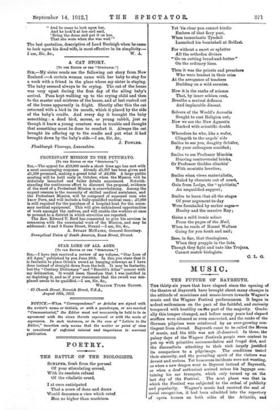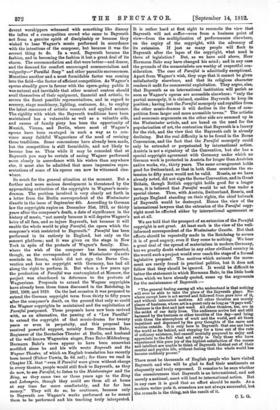M U S I C.
THE FUTURE OF BA.YREUTH.
THE thirty-six years that have elapsed since the opening of
the theatre at Bayreuth have brought about many changes in the attitude of musicians and music-lovers towards Wagner's music and the Wagner Festival performances. It began in ardent enthusiasm on the pan of the faithful, and curiosity tempered with hostility on the part of the majority. Gradu- ally this temper changed, and before many years had elapsed
scoffers were silenced or even converted, and the ranks of the German pilgrims were reinforced by an ever-growing con-
tingent from abroad. Bayreuth came to be called the Mecca of music, and the title was not ill-deserved. In those, the palmy days of the Wagner Festivals people were content to put up with primitive accommodation and frugal diet, and the discomforts attaching to their visit largely justified its comparison to a. pilgrimage. The conditions tested their sincerity, and the prevailing spirit of the visitors was devout and serious. Yet humorous incidents were not wanting,
as when a new dragon went to Beyrout instead of Bayreuth, or when a deaf enthusiast arrived minus his luggage con- taining his ear trumpets, which only turned up on the last day of the Festival. The next phase was that in which the Festival was subjected to the ordeal of publicity and popularity. Wagner's music had received the seal of social recognition, it had been admitted into the repertory of opera houses on both sides of the Atlantic, and
devout worshippers witnessed with something like dismay the influx of a cosmopolitan crowd who came to Bayreuth not from a genuine spirit of discipleship or because they wished to hear Wagner's music performed in accordance with the intentions of the composer, but because it was the correct thing to do. In a word, Bayreuth became the fashion, and in becoming the fashion it lost a great deal of its charm. The accommodation and diet were better—and dearer, and the demand for comfort encouraged commercialism and vulgarity—" Parsifal Soap" and other parasitic excrescences. Meantime another and a most formidable factor was coming into the field—the factor of efficient competition. As Wagner's operas steadily grew in favour with the opera-going public it was natural and inevitable that other musical centres should avail themselves of their equipment, financial and artistic, to secure the finest possible representations, and in regard to scenery, stage machinery, lighting, costumes, &c., to employ the latest resources of artistic research and applied science. The rigidity with which the Bayreuth traditions have been maintained has a vulnerable as well as a valuable side, and excess of family piety has been the opportunity of Munich, Vienna, and Berlin, where most of Wagner's operas have been re-staged in such a way as to con- vince many faithful Wagnerians of the need of revising those traditions. Some concessions have already been made, but the competition is still formidable, and not likely to become less so. Thus while it may be conceded that at Bayreuth you may be certain of seeing Wagner performed more closely in accordance with his wishes than anywhere else, it must also be admitted that more impressive repre- sentations of some of his operas can now be witnessed else- where.
So much for the general situation at the moment. But a further and more serious development is threatened by the approaching extinction of the copyrights in Wagner's music- dramas. The problem involved is very clearly set forth in a letter from the Berlin correspondent of the Westminster Gazette in the issue of September 4th. According to German law the copyrights expire on December 31st, 1913, or thirty years after the composer's death, a date of significance in the history of music, "not merely because it will deprive Wagner's heirs of all fees, and so injure Bayreuth, but because it will enable the whole world to play Parsifal, the opera which the composer's wish restricted to Bayreuth." Parsifal has been performed in its entirety in England, but only on the concert platform; and it was given on the stage in New York in spite of the protests of Wagner's family. Else- where the wish of the composer has been respected, though, as the correspondent of the Westminster Gazette reminds us, Russia, which did not sign the Berne Con- vention and has no copyright with Germany, has bad all along the right to perform it. But when a few years ago the production of Parsifal was contemplated at Moscow, the project was abandoned in deference to the protests of Wagnerians. Proposals to extend the Wagner copyrights have already been three times discussed in the Reichstag, in 1901, 1909, and 1910. On the last occasion it was proposed to extend the German copyright term from thirty to fifty years after the composer's death, on the ground that only so could the Wagner copyrights be maintained and the exploitation of Parsifal postponed. These proposals have now been revived with, as an alternative, the passing of a "Lax Parsifal" to extend the copyright of that music-drama for twenty years or even in perpetuity, and this proposal has received powerful support, notably from Hermann Bahr, Regisseur of the Deutsches Theater at Berlin, and husband of the well-known Wagnerian singer, Frau Bahr-Mildenburg. Hermann Bahr's views appear to have been somewhat modified since he and his wife wrote Bayreuth and the Wagner Theatre, of which an English translation has recently been issued (Fisher Unwin, 2s. 6d. net); for there we read in Chapter IX. that "even if Parsifal were given without charge in every theatre, people would still flock to Bayreuth, as they do now, to see Parsifal, to listen to the Meistersinger and the Bing, as they came two or three years ago to the Bing and Lohengrin, though they could see them all at home at any time far more comfortably, and for far less
money." They will do so, he continues, because only in Bayreuth are Wagner's works performed as he meant them to be performed and his teaching truly interpreted. It is rather hard at first sight to reconcile the view that Bayreuth will not suffer—even from a business point of view—from the multiplication of performances elsewhere, on the expiry of the copyright, with the advocacy of its extension. If just as many people will flock to Bayreuth after the lapse of the copyright, what need is there of legislation P But, as we have said above, Herr Hermann Bahr may have changed his mind ; and in any case the grounds of the memorialists are worthy of respectful con-
sideration. The case of Parszfal is admittedly exceptional.
Apart from Wagner's wish, they urge that it cannot be given satisfactorily elsewhere, and that its religious character renders it unfit for commercial exploitation. They argue, also, that Bayreuth as an international institution will perish as soon as Wagner's operas are accessible elsewhere : "only the
partial monopoly, it is claimed, enables Bayreuth to keep its position; having lost the Parszfal monopoly and royalties from the other music-dramas it will decline in the face of com-
petition from larger and more accessible towns." The artistic and economic arguments on the other side are summed up in
the Westminster article, and are based on the need for the popularization of art, the contention that Bayreuth is a luxury for the rich, and the view that the Bayreuth cult is already declining. But the real difficulty is to be found in the Berne Convention, and the fact that the Parsifal monopoly could only be extended or perpetuated by international action.
Austria is not a signatory of the Convention, but she has a special copyright agreement with Germany under which no German work is protected in Austria for longer than Austrian native works, viz., thirty years. The same arrangement holds good for Switzerland, so that in both these countries the ex- tension to fifty years would not be valid. Russia, as we have already noted, did not sign the Berne Convention, and in Great Britain, though British copyright holds good for a longer
term, it is believed that Parsifat would be set free under a special clause. Thus, with Austria, Switzerland, Russia, and
perhaps England standing on their rights, the chief bulwark of Bayreuth would be destroyed. Hence the view of the international lawyers that the extension of the Parsifal copy- right must be effected either by international agreement or not at all.
We are told that the prospect of an extension of the Parszfal copyright is not great. At least such is the view of the well- informed correspondent of the Westminster Gazette. But that
efforts should be repeatedly made in the Reichstag to secure it is of good augury, even if they come to nothing. We hear
a great deal of the spread of materialism in modern Germany, but we greatly doubt whether in any other civilized country in
the world such a project would ever reach the stage of a formal legislative proposal. The motives which animate the move- ment are rarely found in practical politics, but it does not follow that they should be ignored. It would be difficult to better the statement in which Hermann Bahr, in the little book from which we have already quoted, sums up the arguments for the maintenance of Bayreuth :—
"The general feeling among all who understand is that nothing will ever be able to take the place of the Bayreuth plays. No- where except here is art served and followed from pure love of it, and without interested motives. All other theatres are merely places of business, where art is a guest only as long as it pays well.' Business is the first and last word. All other theatres, too, are in the midst of our daily lives. The audiences arrive hot and still harassed by the business or other troubles of the day—and bring with them the atmosphere of work and the world, and sit there impatient and depressed by the grey thoughts of the cares and worries outside. It is only here in Bayreuth that one can leave the world so far behind, and stepping for a time out of the ruts of ordinary existence, feel oneself mentally prepared to enjoy and appreciate to the full what art really is. Only those who have experienced this pure joy of the highest satisfaction of the senses and intellect are unable to think of Bayreuth blotted out of their mental and psychic rife, without feeling that the whole world has become suddenly poorer."
There must be thousands of English people who have visited Bayreuth and who will be glad to find their sentiments so
eloquently and truly expressed. It remains to be seen whether the consciousness that Bayreuth is an international, and not merely a national, asset will lead to international action. But in any case it is good that an effort should be made. As a modern writer puts it, crusaders are not always successful, but the crusade is the thing, not the result of it. C. L. G.







































 Previous page
Previous page